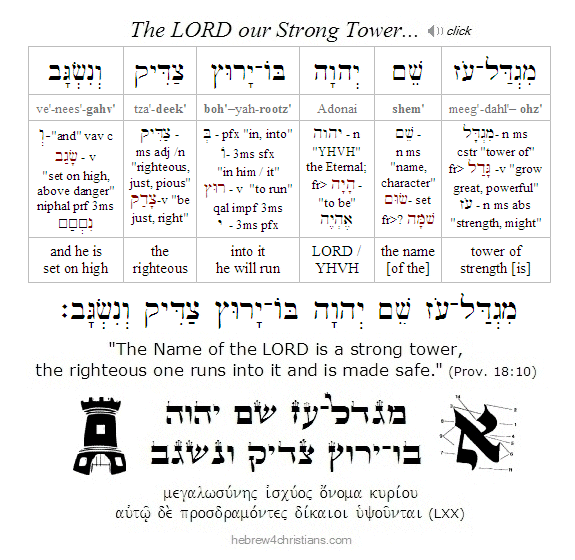|
|
 |
 |
|
The relation between a name (shem) and a thing (davar) is of fundamental importance in the Scriptures. In the Hebraic mindset, naming and being are linked together to form a unity. The right use of a name denotes a right relationship with the thing named, as Adam established dominion over the creatures of the earth by giving them their names
(see Genesis 2:19).
God created the universe yesh me'ayin (out of nothing) by means of His Word (Genesis 1:1). In the Scriptures, the first time God speaks we see that He creates the divine light:
|
 |
 |
|
"And God said, 'yehi or' – let there be light – and there was light" (Genesis 1:3).
Moreover, God "spoke" Adam into being, as it is written:
|
 |
 |
|
 |
|
 |
 |
|
 |
|
|
|
 |
|
|
|
|
|
"And God said 'Let us make man (adam) in our image (tselem) and in our likeness (demut)..." (Genesis 1:26): and Adam became a "living soul" (nefesh chaiyah).
Since man was made in the image and likeness of God, we would expect a strong correlation between human language and reality. Unlike God, we do not literally create reality by means of our words, but we do interpret reality: we evaluate it, make decisions based on our assessments, and we shape the contours of our experience by means of the words we use. In short, each of us is responsible for how we describe reality and whether we will align our words with the truth of reality.
Shakespeare asked, "What's in a name? That which we call a rose by any other word would smell just as sweet" (Romeo and Juliet, II:2), but despite the mystery that may ultimately be implied in the relation between a name and a thing, the Hebraic mindset understands words to be of fundamental importance: since davar in Hebrew means not just "thing" but also "word," implying that knowing the thing is to know the word.
In modern American culture, we use names rather prosaically as identifiers for persons, places, and things. In ancient Hebrew, however, a name (shem) had symbolic and often prophetic significance, so much so that the name of a person literally was identified with that person's life, reputation, character, and even spiritual destiny. God Himself is strongly identified with His Name: in some passages shem Adonai is literally identified as an appearance of Adonai Himself (see Isaiah 30:27); and Paul reminds us that the Pharaoh was raised up so that God could demonstrate the power of His deliverance, in order that "that my Name might be declared throughout all the earth" (Romans 9:17).
|
|
|
The Power of the Word
|
|
 |
 |
|
God graciously chose to reveal His Name (i.e., His character, His manifest Presence by means of His acts and deeds) to the world through the Jewish people. Through the ancient Hebrew Patriarchs, through the great deliverance God effected by means of His servant Moses, through the eloquent oracles and admonitions of the Hebrew prophets, and most especially through the manifestation of His Son Yeshua (Jesus): in all these ways God has revealed His Name. In fact, the Scriptures make it clear that the name of God's Son Yeshua is so vital to our correct apprehension of reality that without it we are literally lost, since we are told explicitly that there is salvation in no other name, "for there is no other name by means of which it is necessary for us to be saved" (Acts 4:12).
Interestingly, we are told that Yeshua, being God's unique Son and therefore equal to God, "humbled Himself" by taking on the form of a servant and was made in the likeness (demut) of man (adam) -- going so far as to become the kapparah (Sin-Bearer) of the world by offering Himself up on the execution stake. "Therefore God has also highly exalted him, and given him a name that is above every name: That at the name of Jesus every knee should bow, of things in heaven, and things in earth, and things under the earth; and that every tongue should confess that Jesus Christ is Lord (Adonai), to the glory of God the Father" (Phil. 2:6-11).
Man is made in the "image and likeness" of God, but instead of being able to create ex nihilo by means of his words, he is given the responsibility to properly confess and to believe the truth. As Paul put it: "If you confess [homologeis, from logeo, "say" and homo, "same"] with your mouth that Jesus is Lord (Yeshua Adonai or Yeshua hu Adon) and believe in your heart that God has raised Him from the dead, you shall be saved. For with the heart man believes unto righteousness; and with the mouth confession is made unto salvation." (Romans 10:9-10).
The choice is ultimately yours: Just as God said, "yehi or" -- let there be light -- and there was light, so we are given the responsibility to speak forth the truth of God's salvation (yeshuah) and to believe it in our hearts.
|
 |
 |
|
The Revealed Names of God
|
 |
 |
|
When God personally reveals His Names to us, He is showing us something of what He is like -- His character, His purposes, His will. Personally knowing and trusting in the Name of the Lord thus can be understood as a sort of response to the very presence of God Himself: we are given the great privilege and responsibility of speaking forth the truth of God's gracious disclosure by confessing and believing the truth. The right use of the name of God -- with genuine kavannah and reverence -- puts us in right relationship with God Himself.
|
 |
 |
|
Hebrew Lesson
Proverbs 18:10 Hebrew reading (click):
<< Return
|
|


